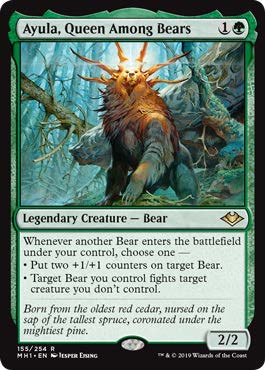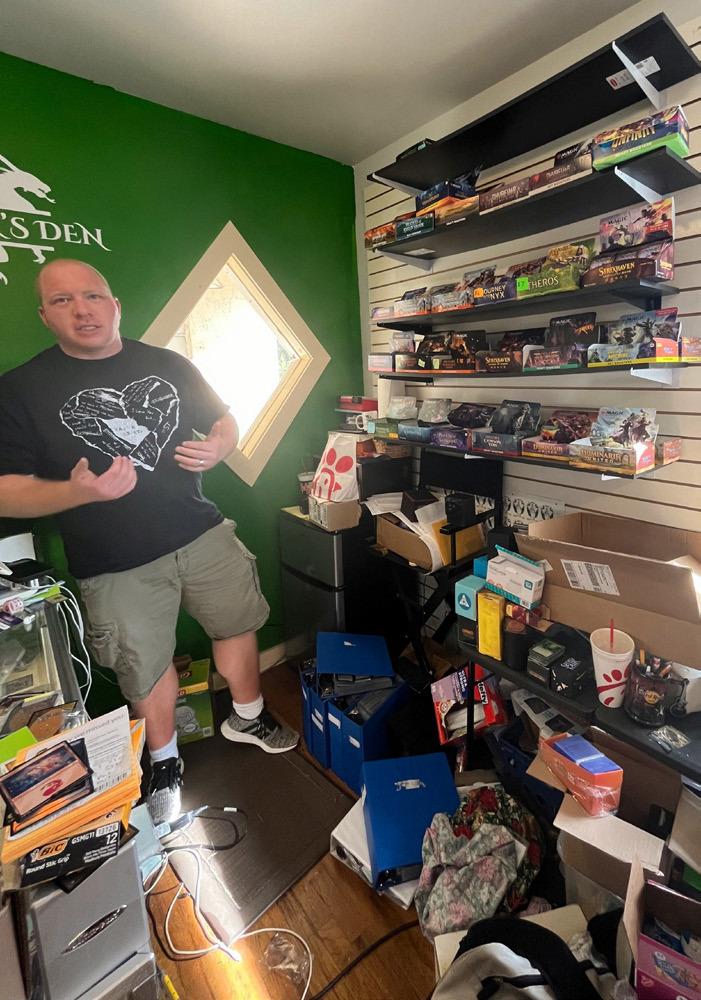Since the beginning of time, humans have always wanted to explore new worlds, forge our own identities and ride off into victory. In 1993, mathematician Richard Garfield created Magic: The Gathering, the internationally acclaimed card-based battle game that lets players do all those things. Becoming known for its unique artwork and gameplay, the series captured the interest of fans worldwide.
It was in the early 2000s when Austin Winkler had returned home to Colorado Springs from college and was looking for a card game to replace the one he used to play growing up. He stumbled upon Magic.
“I was kind of a jock,” he recalled. A three-sport athlete in high school, he remembered whenever he saw the kids at lunch tables playing Magic, he’d say to himself, “Those kids are nerds.”
Austin used to play a Harry Potter card game as a child, and when he discovered that Wizards of the Coast, the company that produced the “Harry Potter” game, also made “Magic,” he decided to give it a try. Entering a world of dragons, dinosaurs, vampires and wizards, his childhood prejudice gave way to unbridled enthusiasm as he found himself jumping in wholeheartedly.
“I loved the artwork, I loved the interaction…it was kind of a chess match,” Austin recalled.
Over the years, the game has developed different playing styles and formats, and with over 1,000 new cards being printed each year, the effects on gameplay and strategy are ever-evolving. New cards have introduced abilities that enhanced or neutralized the powers and abilities of existing cards. In recent years, Magic also began incorporating from other popular series such as Marvel, “Lord of the Rings”, “Assassin’s Creed” and “Jurassic Park”, drawing new fans and interest.
In 2019, Austin started Dragon’s Den Cards and Games, which sells exclusively Magic the Gathering products. He has new starter decks, booster packs, individual cards and even has whole sets for those that are so inclined. Every Thursday around 6:30 p.m., he and a group of fellow enthusiasts play at the shop, located at 2820 W. Colorado Ave., the over-a-century-old house that was once home to the Colorado Kite and Ski shop.
Austin loves having the opportunity to introduce a customer to his first game and then the excitement of seeing the same person come back for a second. He gets excited watching players who get their first deck and then come back to add new cards. He enjoys assisting in new players’ development.
“I love trying to suggest: if you had this card or that card it’ll make your deck more powerful…I can help teach them, watch them become more competitive, become better players and sometimes even better than I am,” he said. “It’s fun to watch players come in and grow in the game.”
Winkler, true to his word, invited me to play, and I obliged.
I learned that each game takes place on the battlefield where a player faces one or more opponents, each with their own unique card deck. A player has a finite number of lives and the goal is to be the last one standing. Players attack one another with creatures, enchantments, sorcery, instants or artifacts that either alter, enhance or destroy other cards already in play. Creatures are the primary card of attack and possess both offensive and defensive ratings designated on the bottom right corner of each card.

For these cards to be brought on the battlefield, they require the accumulation of land cards that produce “manna,” the currency used to activate them. Further adding to the variety are the five main card colors-red, green, blue, black and white, each possessing their own characteristics with the ability to be mixed and matched with other colors.
There were three of us playing – Austin, his friend Tyler and myself. We played a format called “commander” in which each player has a featured card that serves as an “identity” card that can be played throughout the game. In this format, each player starts off with 40 lives.
“It’s not always a bad thing to lose lives,” Tyler explained. Lives are meant to be used and sometimes it’s necessary to take damage to avoid losing a creature that is needed to mount a larger attack later in the game. Furthermore, there are cards that allow players to win without having to drain all their opponents’ life.
Needless to say: many considerations.
My deck relied on bears as the primary attack creature, most of which are not of the cuddly Winnie the Pooh sort.
“You should play this one first,” Austin pointed out, gesturing to my “commander” card: Ayula, Queen Among Bears. Each time I activated a new bear card while this one was on the field, it allowed me to either directly attack another player’s creature or to increase the strength of another creature I owned. Over the course of the game, this can have a cumulative effect.
As we played, each player factored in their opponents’ weaknesses, trying to decide when to attack, when to defend, when to sacrifice a card, when to accept damage and when to push forward with one’s own offensive.
At one point, Austin played a card possessing an ability called “goad,” which, true to its name, forces two of my bears to attack Tyler on the next turn, ultimately leading to their demise.
We always love new players. – Austin Winkler
Later, Tyler played a card that enabled him to search his deck and essentially cast three spell cards for the cost of one, which allowed him to attack me and do 20 damage (that’s a lot).

Throughout the game, I was too preoccupied with learning what my own cards do to consider what Austin and Tyler’s cards might do later. Also, it was obvious they were opting for the role of gracious teachers instead of quick victors.
In the end, it’s a good time and I have no doubt that I learned more new things playing Magic than I would have had I paid attention to the first presidential debate of election season that has been droning on the background TV all this time.
I asked Austin if he has any last thoughts for folks who might be interested in getting into Magic.
“Just give it a try some time. We always love new players,” he said. “We always love having people stop by who haven’t played Magic in a long time or are looking for a fun place to hang on Thursday nights.”
For those interested in checking out Dragon’s Den, the store is open every Thursday from 4 to 10:30 p.m. The best way to reach Winkler is by email at dragonsdencs@gmail.com.
IF YOU GO
Magic: The Gathering
Dragon’s Den Cards and Games
2820 W. Colorado Ave.
Every Thursday at 6:30 p.m.
Info: dragonsdencs@gmail.com; dragonsdencs.com

